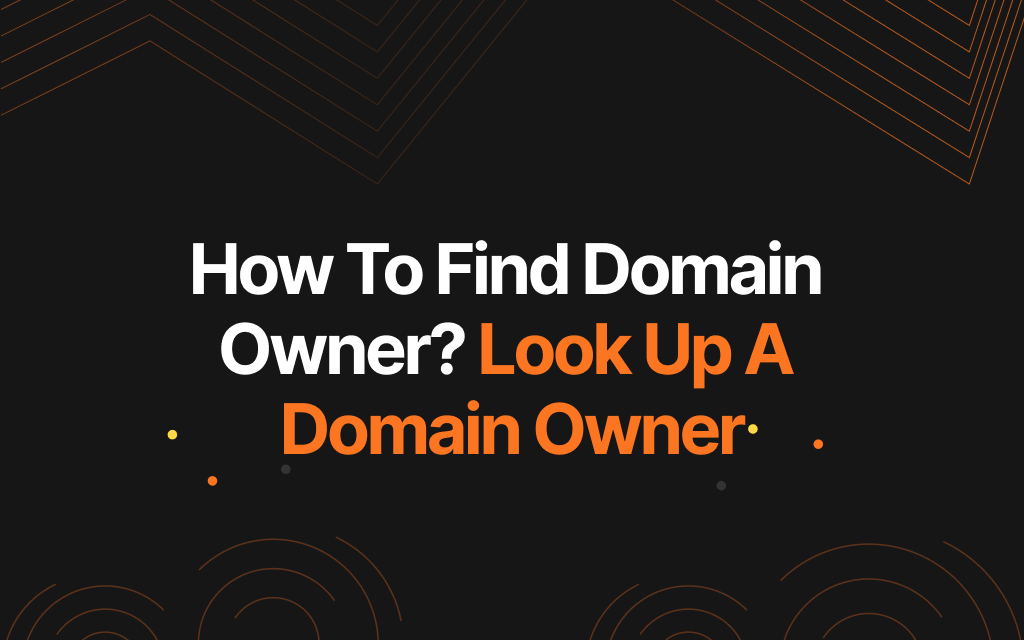As we venture into the digital world, finding the owner of a domain name becomes crucial for various reasons.
In this comprehensive guide, we will explore the significance of domain owner lookup, understand the process, and provide a step-by-step tutorial to help you find the domain owner you’re looking for. So, let’s dive in and unravel the mystery behind domain ownership.
Understanding Domain Ownership and WHOIS
What is domain ownership?
Domain ownership refers to the person or entity that has legal control over a specific domain name. This ownership grants the right to use, modify, or transfer the domain as the owner sees fit, as long as it complies with the rules set by the domain registrar and the Internet Corporation for Assigned Names and Numbers (ICANN).
The Role of domain registrars
Domain registrars are accredited organizations responsible for managing domain name registrations. They serve as an intermediary between the domain owner and the domain registry, maintaining the necessary records for each domain name, and ensuring its availability across the internet.
The purpose of WHOIS databases
WHOIS databases contain essential information about domain names, including details about the domain owner, registrar, and the domain’s registration and expiration dates. These databases are public and can be accessed by anyone seeking information about a specific domain name.
Privacy protection and its impact on domain owner lookups
Privacy protection services, offered by many domain registrars, allow domain owners to hide their personal information from WHOIS databases. This can make it challenging to find domain owner details, but there are alternative methods to uncover this information, as we will discuss later in this guide.
Useful Tools For Finding Domain Owner’s Information
Here are some websites that can be useful for finding domain owner information, categorized based on their primary function:
WHOIS Lookup Websites:
Domain Registrar Websites:
IP Address Lookup Websites:
Domain Monitoring Websites:
Security and Anti-Phishing Websites:
It’s important to note that some websites may require a fee to access certain information or provide more detailed reports. Additionally, some domain owners may opt to use privacy protection services to mask their personal information from WHOIS lookups.
How to Look Up a Domain Owner in Singapore: Step-by-Step Guide

Step 1: Identify the target domain
Before you can look up a domain owner, you must first identify the domain name you want to investigate. This could be a domain you are interested in purchasing or one that is causing issues, such as copyright infringement or cyber-squatting.
Step 2: Access a reputable WHOIS lookup tool
There are numerous WHOIS lookup tools available online, both free and paid. Some examples include ICANN’s WHOIS Lookup, WHOIS.com, and DomainTools.
Step 3: Enter the domain name and perform the search
Once you’ve chosen a WHOIS lookup tool, input the domain name you’re interested in and execute the search. The tool will then fetch the available information from the WHOIS database.
Step 4: Analyze the WHOIS record for the domain owner information
After performing the search, the WHOIS lookup tool will display the domain’s record. This may include the domain owner’s name, contact details, domain registration and expiration dates, and the domain’s registrar.
Step 5: Understanding limitations and potential obstacles
Sometimes, the domain owner’s information might be hidden or unavailable. In such cases, consider the following:
- Privacy protection services: If the domain owner has opted for privacy protection, their contact details will be replaced with those of the privacy service provider.
- Inaccurate or outdated information: The WHOIS database relies on domain owners to update their information. Therefore, the details provided might be outdated or incorrect.
Alternative Methods for Finding Domain Owner Information
Reverse DNS lookup
Reverse DNS lookup tools, such as MXToolbox, allow you to find domain owner information by searching for the IP address associated with the domain.
Using search engines and online resources
You can try using search engines to find domain owner information by searching for the domain name along with specific keywords like “owner” or “contact.” You may also find details on websites like LinkedIn, Twitter, or other social media platforms where the domain owner may have shared their contact information.
Contacting the hosting provider or domain registrar
In some cases, you can contact the domain registrar or hosting provider to request the domain owner’s contact information. While they may not be able to provide the information directly, they might be able to forward your message to the domain owner on your behalf.
Utilizing professional services and investigators
If you’re unable to find the domain owner’s information through other methods, consider hiring a professional service or investigator who specializes in domain ownership investigations. These professionals have access to resources and techniques that can help uncover the information you seek.

Tips for Contacting a Domain Owner in Singapore
Drafting a clear and concise message
When reaching out to a domain owner, ensure your message is clear, concise, and professional. Include the reason for your inquiry and any relevant information about your intentions, such as purchasing or partnering.
Respecting the owner’s privacy
Keep in mind that the domain owner’s privacy is crucial. Be respectful and avoid sharing their contact information with others or using it for purposes other than your stated intentions.
Negotiating domain purchases or transfers
If you’re interested in acquiring the domain, be prepared to negotiate. Understand the domain’s value and be open to discussing terms that are mutually beneficial for both parties.
Dealing with unresponsive domain owners
If the domain owner does not respond to your inquiries, be patient and consider alternative methods of contact. It’s possible that they are not interested in engaging, or they may not have received your message.
Common Problems You Encounter in Finding The Domain Owner in Singapore
Finding the owner of a domain name can be a challenging task, particularly when dealing with issues related to privacy protection, inaccurate information, multiple parties involved, language barriers, and legal hurdles.
The domain owner’s information is often critical for various reasons, including domain acquisition, resolving domain-related issues, legal disputes, and business inquiries. In this context, it is essential to understand the common challenges that can arise when trying to locate a domain owner and the possible solutions for addressing them.
This knowledge can be helpful for individuals, organizations, and legal professionals dealing with domain-related matters.
| Challenge | Description |
|---|---|
| Privacy Protection | Domain owners may choose to hide their personal information by using a domain privacy service or by providing false information during registration. |
| Inaccurate or Outdated Information | Contact information provided during domain registration may be inaccurate or outdated, making it difficult to locate the current domain owner. |
| Multiple Parties Involved | Sometimes, there may be multiple parties involved in the ownership of a domain, such as a registrant, administrative contact, technical contact, or even a domain broker or reseller. |
| Language Barriers | Domain owners may be located in different countries with different languages, making communication and information gathering challenging. |
| Legal Hurdles | In some cases, legal issues may arise that prevent the disclosure of the domain owner’s information, such as ongoing litigation or court order. |
Legal Aspects of Domain Ownership and Disputes
Domain squatting and cyber-squatting
Domain squatting and cyber-squatting involve registering domain names that are similar to existing trademarks or brands, often with the intent of profiting from the confusion or selling the domain to the rightful owner at an inflated price. This practice is illegal in many jurisdictions.
Trademark infringement and domain disputes
Domain disputes may arise when a domain name infringes on someone else’s trademark rights. If you believe your trademark is being infringed upon, consider seeking legal advice to understand your options.
ICANN’s Uniform Domain-Name Dispute-Resolution Policy (UDRP)
The UDRP is a policy established by ICANN to resolve domain disputes. If you have a domain dispute, you can file a complaint under the UDRP to seek resolution. The process involves submitting your complaint to an approved dispute resolution service provider, who will then review the case and issue a decision.
Legal recourse in cases of domain ownership disputes
If your domain ownership dispute cannot be resolved through the UDRP, you may need to pursue legal action. Consult with an attorney who specializes in domain disputes to understand your options and the best course of action.
Frequently Asked Questions (FAQs)
- Why would someone want to find a domain owner? There are several reasons, including domain acquisition, resolving disputes, reporting illegal activities, or addressing copyright infringement issues.
- Can domain owners hide their information from WHOIS databases? Yes, domain owners can use privacy protection services to mask their personal information in WHOIS databases. In such cases, the domain owner’s contact information is replaced with that of the privacy service provider.
- Are there any fees associated with using WHOIS lookup tools? While many WHOIS lookup tools are free, some offer advanced features or more in-depth information for a fee. Additionally, professional services and investigators may charge for their expertise in finding domain owner information.
- What can I do if a domain owner does not respond to my inquiries? You may try alternative methods of contact, such as reaching out through social media or contacting the domain registrar or hosting provider. If all else fails, consider hiring a professional service or investigator to help with your inquiry.
- Is it legal to register a domain name that is similar to an existing trademark or brand? Registering a domain name that is intentionally similar to an existing trademark or brand with the intent to profit from the confusion or sell the domain at an inflated price (domain squatting or cyber-squatting) is illegal in many jurisdictions. If you believe your trademark rights are being infringed upon, consider seeking legal advice to understand your options.
Finding domain owner information is crucial for various reasons, from resolving disputes to acquiring domains for business purposes. By following our comprehensive guide, you’ll be better equipped to navigate the complexities of domain ownership and conduct effective domain owner lookups.
Remember to respect the domain owner’s privacy and always approach your inquiries professionally and ethically.

Keen to Work With Us?
At Jin Design, we offer website design and development services that can help you reach your business objectives while highlighting your brand’s unique identity. Our team of experts will work closely with you to create a custom website that meets your specific requirements.
Our services cover the latest design trends and innovative technologies, such as responsive design, e-commerce integration, and personalized functionality.
If you’re interested in starting a website project that truly reflects your brand, please don’t hesitate to contact us today. We’ll help you unleash the full potential of a website that captures your brand essence.







